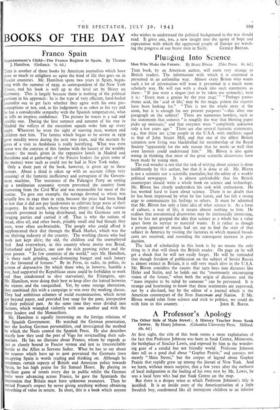BOOKS OF THE DAY
Franco Spain
Tins is another of those books by American journalists which have done so much to enlighten us upon the kind of life that goes on in Fascist .countries. Mr. Hamilton spent two years in Spain, begin- ning with the summer of 1939, as correspondent of the New York Times, and his book is well up to the level set by Shirer on Germany. This is largely because there is nothing of the political partisan in his approach: he is the type of very efficient, hard-boiled journalist out to get facts whether they agree with his own pre- conceptions or not, and, as his judgement is as sober as his eye and he has a considerable sympathy with the Spanish temperament, what he tells us inspires confidence. The picture he traces is a sad and terrible one. During the first summer and autumn of his stay in Madrid the volleys of the execution squads woke him up every night. Wherever he went the sight of starving men, women and children met him. The famine which began to be severe in 1939 grew steadily worse during the next two years, and the account he gives of a visit to Andalusia is really horrifying. What was even worse was the contrast of this famine with the luxury of the wealthy classes : the meals given in the expensive hotels in Madrid and Barcelona and at gatherings of the Fascist leaders (he gives some of the menus) were such as could not be hid in New York today.
Only a short part of the book, however, is given up to these horrors. About a third is taken up with an account (often very amusing) of the fantastic inefficiency and corruption of the Govern- ment machine. The insistence of the Falangist Party on setting up a totalitarian economic system prevented the country from recovering from the Civil War and was responsible for most of the famine. To give one example, the acreage devoted to wheat was actually less in 1941 than in 1939, because the price had been fixed so low that it did not pay landowners to cultivate large areas of their property. In the north, where there was plenty of food, the various controls prevented its being distributed, and the Germans sent in foraging parties and carried it off. That. is why the rations of bread, olive oil, and other foods, pitiably small and bad though they were, were often unobtainable. The people who .could afford it supplemented their diet through the Black Market, which was the one thriving industry of the country. The working classes who had work just kept alive; the old, the children and the unemployed died. And everywhere, in this country whose motto was Mead, Fatherland and Justice, one saw the rich growing richer and the poor poorer. "In few countries of the world," says Mr. Hamilton, "is there such grinding, soul-destroying hunger and such luxury for the favoured of fortune." By its Press, its radio, its police, its system of depuracion (by which those who, in howevei humble a way, had supported the Republican cause could be forbidden to work and thus condemned to slow starvation), the Falangists, says Mr. Hamilton, were doing their best to keep alive the hatred between the victors, and the vanquished. Yet, by some strange aberration, they combined thii with a campaign to win over the working classes. They had ambitious schemes of social reconstruction, which never got beyond paper, and provided free soup for the poor, irrespective of their political past. • At the same time they were divided into factions, which wrangled violently with one another and with the army leaders and the Monarchists.
Mr. Hamilton is equally interesting on the foreign relations of the Spanish Government. He watched the German penetration,
met the leading German personalities, and investigated the method
by which the Nazis control the Spanish Press. He also describes exactly how they used the port of Vigo for revictualling their sub- marines. He has no illusions about Franco, whom he regards as just as closely bound to Fascist system and just as irreconcilably hostile to the Allies as Serrano Sutler. What he has to say about the reasons which have up to now prevented the Germans from occupying Spain is worth reading and thinking on. Although he condemns certain aspects of British and American policy towards Spain, he has high praise for Sir Samuel Hoare. By playing an excellent game of tennis every day in public whilst the German tanks were advancing across France, he gave the Spaniards the Impression that Britain must have unknown resources. Then he earned Franco's respect by never giving anything without obtaining something of value in return. In short, this is a book which anyone who wishes to understand the political background to the war should read. It gives one, too, a new insight into the agony of hope and expectation with which the oppressed people of Europe are watch-
ing the progress of our brave men in Sicily. GEFtALD BRENAN.






















 Previous page
Previous page